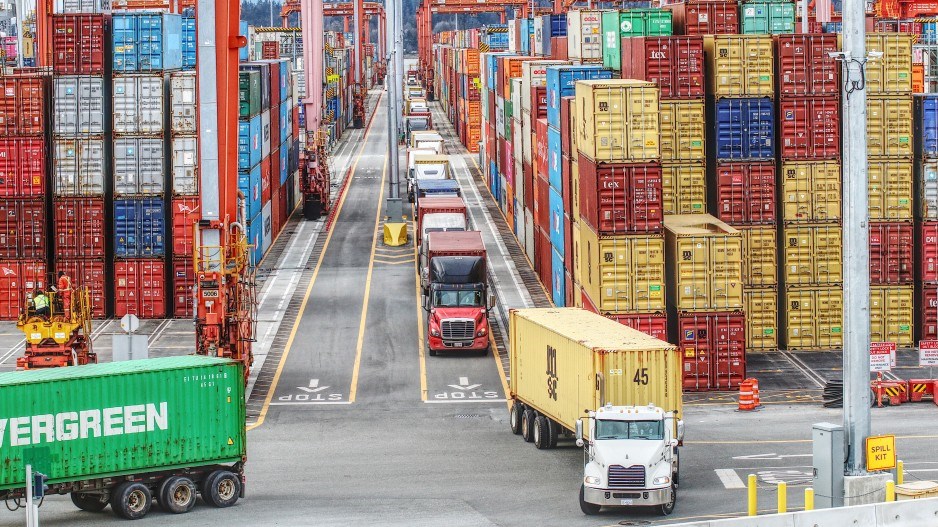sa国际传媒 port workers have ratified a new collective agreement that will bring labour peace to the province’s critically important Asia-Pacific Gateway until 2027.
ILWU sa国际传媒's 75 per cent vote in favour of accepting the new four-year deal follows a tumultuous round of on-again-off-again negotiations, and stalled freight movement that began soon after the previous five-year deal between the BC Maritime Employers Association (BCMEA) and ILWU-sa国际传媒 expired at the end of March.
ILWU leadership fired an initial warning shot across the negotiating table bow when it filed a notice of dispute with the Federal Mediation and Conciliation Service (FMCS) after only a handful of meetings with the BCMEA.
A subsequent 13-day strike that began on July 1 disrupted an estimated $11 billion in cargo and raised more red flags internationally over sa国际传媒’s reputation for maritime cargo movement reliability.
This week’s contract ratification will therefore provide some relief to the companies and industries in sa国际传媒 and across the country whose businesses rely on trade through the country’s Asia-Pacific Gateway.
It also follows the contract settlement achieved earlier this year along the U.S. West Coast when ILWU sa国际传媒’s counterpart in the United States reached a tentative agreement on a six-year deal with the Pacific Maritime Association (PMA) that provides for a 32 per cent wage increase over the term of the contract for the 22,000 unionized dockworkers employed at 29 ports along the U.S. West Coast.
That settlement came with only minimal cargo disruption at major U.S. container cargo hubs.
The BCMEA said the renewed collective agreement “includes increases in wages, benefits and training that recognizes the skills and efforts of sa国际传媒’s waterfront workforce, while providing certainty and stability for the future of sa国际传媒’s West Coast ports.”
The four-year deal accepted by the union provides wage increases of 19.2 per cent and increases the annual median union longshore wage to $162,000 from $136,000, not including benefits and pension. It also provides a $3,000 signing bonus for each full-time worker.
ILWU sa国际传媒 negotiators had been seeking wage increases of 11 per cent in the first year of a new contract and six per cent in the second year.
The deal accepted this week is fundamentally the same as the tentative agreement previously rejected.
Assessing how much 2023’s disruption at sa国际传媒 ports has blunted their competitive edges in the ongoing fight for transpacific cargo business will take much longer to gauge.
The migration of container cargo traffic away from West Coast North America to competing ports along the Gulf and east coasts of the continent and to Mexico has been an ongoing concern for sa国际传媒, Washington and California since the 2016 opening of the widened Panama Canal.
Transpacific trade has also slowed significantly this year.
As container shipping analyst John McCown notes in his most recent report, June was the fifth worst year-over-year decline for inbound container cargo to the 10 largest U.S. ports. It was also the ninth straight month of double-digit percentage declines at those ports. Cargo declines at West Coast ports (down 18.9 per cent) were weaker than at their East Coast counterparts (18.2 per cent) even though the mid-June settlement in the U.S. West Coast port workers contract resulted in a spike in business at major California container cargo hubs.
In a statement, the BCMEA said it “recognizes and regrets the profound repercussions this labour disruption has had on the national economy, workers, businesses and ultimately, all Canadians that depend on an efficient and reliable supply chain.”
It added that “all supply chain stakeholders must collaborate now to ensure we do not see disruptions like this ever again.”
sa国际传媒 business groups agreed.
Bridgitte Anderson, the Greater Vancouver Board of Trade’s president and CEO, said that while businesses in sa国际传媒 and across the country “are breathing a sigh of relief that ports and supply chains are returning to normal … the impact of this strike on our economy has been significant.… Our priority must be to strengthen the resilience and stability of our domestic supply chains and international trade relationships. As an open and trading economy, sa国际传媒 needs to rebuild its reputation as a reliable trading partner. It took unexpected and extraordinary tools to facilitate an end to the disruption. Moving forward, the federal government needs to expand its options for addressing labour disruptions that impact the national economy and supply chains.”
Meanwhile, Dan Kelly, president and CEO of the Canadian Federation of Independent Business, said the sa国际传媒 port strike, its subsequent supply chain disruption and the damage it caused to small businesses across the country make it a case study in “the urgent need to rethink sa国际传媒’s labour laws, ensuring that the needs of the broader economy and sa国际传媒’s international reputation are considered in cases of strikes and lockouts in critical areas. The government should make ports an essential service, so they remain fully operational while negotiations are happening. In addition, the government’s promise to ban replacement workers should be scrapped as it would further tilt the balance of labour laws in favour of unions.”
This story was originally filed on August 4.
@timothyrenshaw



